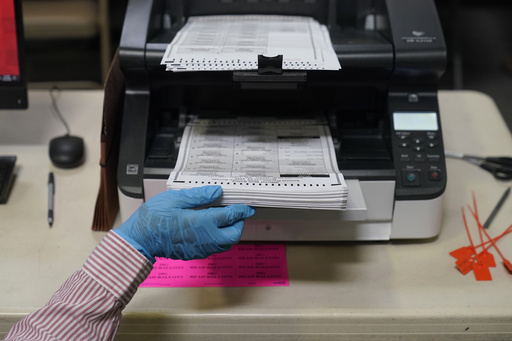
LAS VEGAS — On Monday, the Nevada Supreme Court delivered a verdict affirming that mail-in ballots characterized by unclear, smudged, or absent postmarks can be counted for up to three days following the closure of polls on Election Day.
This ruling came as the court declined a request from both state and national Republican parties, alongside former President Donald Trump’s campaign and a voter named Scott Johnston, aimed at prohibiting the counting of these ballots. The argument presented by the GOP suggested that mail-in voting disproportionately benefits Democratic voters.
The legal dispute arose after Nevada Secretary of State Cisco Aguilar, affiliated with the Democratic Party, directed county election officials in May to count ballots lacking clear postmarks until 5 p.m. on the Friday after Election Day, which falls on November 8 this year.
Aguilar expressed that this ruling would enable election operations in Nevada to proceed seamlessly, minimizing the potential for voter disenfranchisement that could occur through no fault of their own. He also commended the efforts of election staff for enhancing the processing capabilities for mail ballots during this election cycle.
In response to the ruling, Claire Zunk, a spokesperson for the Republican National Committee, articulated that the court’s decision has compromised the integrity of elections in Nevada.
The ruling upheld an earlier decision made by Judge James Todd Russell in Carson City last August, following oral presentations before the seven-member court on October 8. It remains uncertain whether the plaintiffs will seek a re-examination by the justices.
While five justices recognized the ambiguity in state law regarding vote counting for ballots with indeterminate postmarks or processing dates, the ruling indicated that state lawmakers likely intended to broaden the voting capabilities for Nevadans. Two justices expressed concurrence but issued separate opinions in writing.
In 2020, Nevada adopted universal mail voting, ensuring that all registered voters receive a ballot in the mail unless they choose to opt out. Voters can also submit ballots in person, either during early voting or on Election Day. According to state laws, signed mail ballots with postmarks can also be counted until 5 p.m. on the Saturday subsequent to Election Day.
The court acknowledged that the Republican National Committee claimed that Democrats have a tendency to vote by mail more than Republicans and that counting mail-in ballots received post-Election Day could favor Democratic candidates.
As of Monday, there were nearly 2 million active registered voters in Nevada, with Aguilar’s office reporting over 643,000 mail, early, and overseas votes having already been submitted. Among these, about 40% were registered Republicans, nearly 35% were Democrats, and approximately 25% registered under other affiliations. Early voting concludes this Friday.
The Supreme Court’s ruling referenced a prior conclusion by a federal judge, relating to a Trump campaign’s challenge against the Nevada election results in 2020, indicating that permitting three extra days for mail-in ballots without postmarks to be delivered establishes a “presumption that the ballot was cast in time.”
Moreover, the ruling mentioned that out of more than 383,000 ballots cast statewide during the June primaries, only 24 were identified as lacking postmarks, suggesting that such errors were random omissions from postal services. Notably, two-thirds of the ballots cast during the Nevada primaries were submitted via mail, according to records from the Secretary of State.
The justices also determined that the committee did not prove it had the standing to pursue a court order to block the counting of these ballots nor did it demonstrate potential “irreparable harm” if the votes were to be counted.
As one of the seven key battleground states anticipated to result in a close presidential election next week, Nevada holds a significant position alongside Arizona, Georgia, Michigan, North Carolina, Pennsylvania, and Wisconsin.
It is classified as one of eight states employing all-mail elections, and one of 19 states that allow the counting of postmarked ballots after Election Day.
Recently, a three-judge panel from the 5th Circuit Court of Appeals ruled that Mississippi may not count mail-in ballots arriving shortly after Election Day; however, this decision is not expected to influence the election slated for November 5. The ruling highlighted that federal courts typically discourage modifications to established election procedures close to an election.
Currently, there are 13 active court cases pertaining to elections in Nevada, including the case resolved on Monday by the state Supreme Court.
Among these, national and state Republicans are appealing a July dismissal of a lawsuit in the 9th Circuit Court of Appeals in San Francisco, which sought to prevent counting any mail ballots received after Election Day.
On the same day, the U.S. Postal Service issued guidance to voters utilizing mail ballots, advising them to mail their ballots by Tuesday to ensure they arrive by Election Day.
